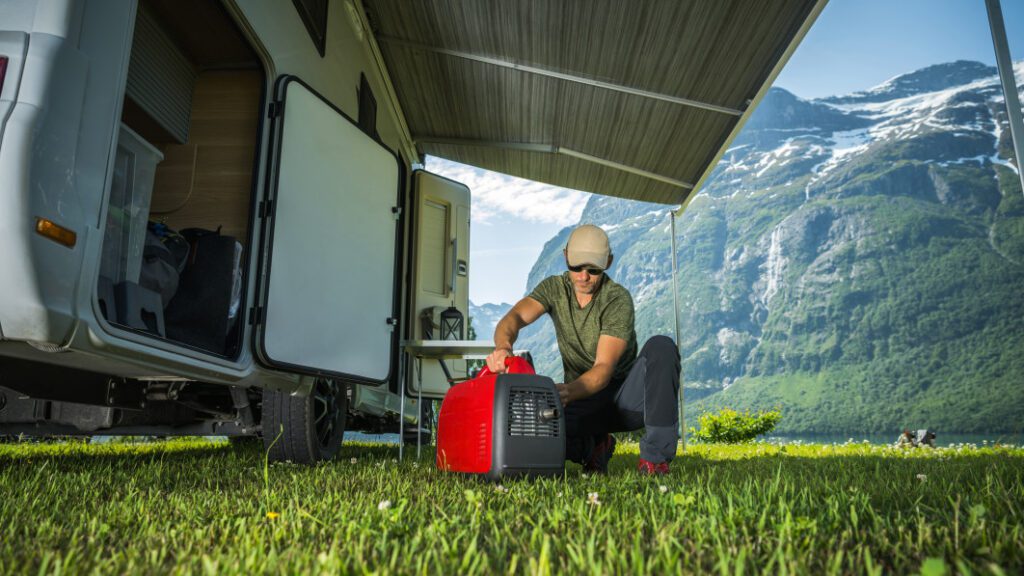The best generators for RVs in 2023

Autoblog may receive a share from purchases made via links on this page. Pricing and availability are subject to change.
If you are away at a campsite or spending some time off-grid, you should consider bringing a generator for your camper along. They can be powered by gasoline or propane and can be used to plug in many different appliances. Appliances such as air conditioning, refrigerators, fans, TVs, laptops, cellphones and other important devices can be charged with these generators. Here are the best generators for RVs available on Amazon.
$465.91 at Amazon
Key Features
Starting Watts: 4,250w
Running Watts: 3,500w
Up to 22 hours of runtime
4 mode intelligauge
3 year limited warranty
Free lifetime technical support
This Champion Power Equipment RV Ready Open Frame Inverter Generator is powered by a four-stroke gas engine and reaches a maximum output of 4,250 starting watts and 3,500 running watts. It has a 120v 30A RV outlet, two 120V 20A household outlets and two USB ports. Free lifetime technical support and a 3-year limited warranty is included with your purchase.

$599.99 at Amazon
Key Features
Starting Watts: 3,200w
Running Watts: 2,800w
120v 20a AC and 120v 30A AC outlets
4-stroke 145cc engine
Low oil shutoff
1 year warranty
The GENMAX Portable Inverter Generator has a 4-stroke 145cc engine and reaches up to 3,200 starting watts and 2,800 running watts. It has a 1 gallon gas tank with 8 hours of runtime when full and a low oil shutoff mode. It also has an economy to extend the engine running time of the generator. A 1-year warranty comes with the purchase of this product.

$329.00 at Amazon
Key Features
Starting Watts: 4,650w
Running Watts: 3,600w
120v 30a AC outlets
212cc engine
Up to 14 hours of runtime
3 year limited warranty
The Westinghouse Outdoor Power Equipment Portable Generator has a 4-stroke 212cc engine that supplies a peak wattage of 4,650w and 3,600 running watts. There are two 120v 30a AC outlets and a 120v AC 20A outlet. It can reach up to 14 hours of runtime on a full fuel tank. It also comes with a 3-year limited warranty.

$549.00 at Amazon
Key Features
Starting Watts: 5,500w
Running Watts: 4,500w
Runs on propane or gas
Low oil sensor
2 120v 20A outlets
224cc engine
This DuroMax XP5500EH is a dual fuel RV Generator gives you the option to choose between gas or propane to power it. It packs a large amount of power with 5,500 starting watts and 4,500 running watts. It’s built to last as it has all copper wirings and a durable metal frame.

$639.99 at Amazon
Key Features
Starting Watts: 3,800w
Running watts: 3,400w
Half-load runtime up to 8.5 hours
Three 120V receptacles
Quiet operation at 57 decibels
Low fuel shutoff
2 year warranty
This WEN Super Quiet RV Ready Portable Inverter Generator has earned the “super quiet” label, as its sound levels are only 57dBA. Its engine supplies a maximum output of 3,800w and has a half-load runtime lasting up to 8 hours. It has two three-prong 120V outlets, one 120V NEMA TT-30R outlet, a 12V DC outlet and two USB ports. This generator also comes with a two-year warranty.
How to choose the right generator for your RV
When it comes to choosing the best portable power source for your motorhome, think about how many devices you need to operate. Also consider how long the trip is and how much time you will be spending in your RV. If you just take out your RV every now and then a small generator will suffice, but more serious motorhome owners should consider a larger generator.
Inverters vs generators
They may look the same and do a lot of the same things, but there are a few key differences between inverters and generators to take note of. Inverters are more compact, quieter, have better fuel efficiency and require less maintenance. Traditional generators are larger, heavier, require more maintenance but they have more power and are cheaper.
Starting watts vs running watts
For many generators, the wattage being advertised is the peak starting watts output while there is less emphasis on running watts which is just as important. According to LCEC, “Running, or rated watts are the continuous watts needed to keep items running. Starting watts are extra watts needed for two to three seconds to start motor-driven products like a refrigerator or circular saw, this is the maximum wattage the generator can produce.”



